Submitted:
25 March 2024
Posted:
26 March 2024
You are already at the latest version
Abstract
Keywords:
1. Introduction and Problem Statement
2. Literature Review
3. Methodology
- Define the study area
- Develop the event categories and data to include in the Seasonal Event Matrix,
- Populate the SEM with posted information, initially from national sources but supplemented by desktop scans and local knowledge,
- Validate the information with various regional stakeholders.
3.1. Define the Study Area
3.2. Define the Risks/Events to Include in the SEM
3.3. Develop and Populate the SEM Model
National Risks
Localized Events
Stakeholder Engagement
4. Results
5. Discussion
6. Conclusion
Supplementary Materials
Appendix A
| Hazard Type | Definition in National Registry |
| Avalanche | An Avalanche is a mass of snow in swift motion traveling down a mountainside |
| Coastal Flooding | Coastal Flooding is when water inundates or covers normally dry coastal land as a result of high or rising tides or storm surges. |
| Cold Wave | A Cold Wave is a rapid fall in temperature within 24 hours and extreme low temperatures for an extended period. The temperatures classified as a Cold Wave are dependent on the location and defined by the local NWS weather forecast office. |
| Drought | A Drought is a deficiency of precipitation over an extended period of time resulting in a water shortage. |
| Earthquake | An Earthquake is a shaking of the earth’s surface by energy waves emitted by slowly moving tectonic plates overcoming friction with one another underneath the earth’s surface. |
| Hail | Hail is a form of precipitation that occurs during thunderstorms when raindrops, in extremely cold areas of the atmosphere, freeze into balls of ice before falling towards the earth’s surface. |
| Heat Wave | A Heat Wave is a period of abnormally and uncomfortably hot and unusually humid weather typically lasting two or more days with temperatures outside the historical averages for a given area. The temperatures classified as a Heat Wave are dependent on the location and defined by the local NWS weather forecast office. |
| Hurricane | A Hurricane is a tropical cyclone or localized, low-pressure weather system that has organized thunderstorms but no front (a boundary separating two air masses of different densities) and maximum sustained winds of at least 74 miles per hour (mph). The Hurricane data also include tropical storms for which wind speeds range from 39 to 74 mph. |
| Ice Storm | An Ice Storm is a freezing rain situation (rain that freezes on surface contact) with significant ice accumulations of 0.25 inches or greater. |
| Landslide | A Landslide is the movement of a mass of rock, debris, or earth down a slope. |
| Lightning | Lightning is a visible electrical discharge or spark of electricity in the atmosphere between clouds, the air, and/or the ground often produced by a thunderstorm. |
| Riverine Flooding | Riverine Flooding is when streams and rivers exceed the capacity of their natural or constructed channels to accommodate water flow and water overflows the banks, spilling into adjacent low-lying, dry land. |
| Strong Wind | Strong Wind consists of damaging winds, often originating from thunderstorms, that are classified as exceeding 58 mph. |
| Tornado | A Tornado is a narrow, violently rotating column of air that extends from the base of a thunderstorm to the ground and is visible only if it forms a condensation funnel made up of water droplets, dust, and debris. |
| Tsunami | A Tsunami is a wave or series of waves generated by an earthquake, landslide, volcanic eruption, or even a large meteor hitting the ocean and causing a rise or mounding of water at the ocean surface. A Tsunami can travel across the open ocean at about 500 mph and slow down to about 30 mph as it approaches land, causing it to grow significantly in height. |
| Volcanic Activity | Volcanic Activity occurs via vents that act as a conduit between the Earth’s surface and inner layers, and erupt gas, molten rock, and volcanic ash when gas pressure and buoyancy drive molten rock upward and through zones of weakness in the Earth’s crust. |
| Wildfire | A Wildfire is an unplanned fire burning in natural or wildland areas, such as forest, shrub lands, grasslands, or prairies. |
| Winter Weather | Winter Weather consists of winter storm events in which the main types of precipitation are snow, sleet, or freezing rain. |
| ALABAMA | LOUISIANA | MISSISSIPPI | Total | |||||
|---|---|---|---|---|---|---|---|---|
| Row Labels | Count of Episode Id | Count of Event ID | Count of Episode Id | Count of Event ID | Count of Episode Id | Count of Event ID | Count of Episode Id | Count of Event ID |
| Astronomical Low Tide | 45 | 163 | 1 | 1 | 46 | 164 | ||
| Coastal Flood | 10 | 22 | 20 | 61 | 11 | 14 | 41 | 97 |
| Cold/Wind Chill | 12 | 138 | 8 | 99 | 6 | 77 | 26 | 314 |
| Debris Flow | 5 | 5 | 1 | 1 | 6 | 6 | ||
| Dense Fog | 4 | 4 | 5 | 5 | 2 | 2 | 11 | 11 |
| Drought | 232 | 2,096 | 87 | 682 | 87 | 870 | 406 | 3,648 |
| Dust Devil | 6 | 6 | 2 | 2 | 8 | 8 | ||
| Excessive Heat | 18 | 48 | 32 | 199 | 27 | 358 | 77 | 605 |
| Extreme Cold/Wind Chill | 4 | 24 | 3 | 6 | 2 | 23 | 9 | 53 |
| Flash Flood | 533 | 1,715 | 458 | 1,595 | 596 | 2,351 | 1,587 | 5,661 |
| Flood | 111 | 380 | 121 | 205 | 63 | 158 | 295 | 743 |
| Freezing Fog | 5 | 19 | 5 | 19 | ||||
| Frost/Freeze | 49 | 477 | 2 | 22 | 51 | 499 | ||
| Funnel Cloud | 78 | 121 | 79 | 105 | 52 | 63 | 209 | 289 |
| Hail | 905 | 3,183 | 725 | 2,090 | 856 | 3458 | 2486 | 8,731 |
| Heat | 80 | 526 | 74 | 748 | 52 | 781 | 206 | 2,055 |
| Heavy Rain | 105 | 185 | 59 | 118 | 48 | 80 | 212 | 383 |
| Heavy Snow | 34 | 213 | 16 | 113 | 23 | 338 | 73 | 664 |
| High Surf | 4 | 4 | 4 | 4 | ||||
| High Wind | 30 | 78 | 12 | 35 | 11 | 66 | 53 | 179 |
| Hurricane | 2 | 7 | 6 | 69 | 3 | 11 | 11 | 87 |
| Hurricane (Typhoon) | 5 | 72 | 1 | 8 | 6 | 80 | ||
| Ice Storm | 10 | 65 | 14 | 82 | 19 | 162 | 43 | 309 |
| Lightning | 281 | 363 | 180 | 210 | 192 | 238 | 653 | 811 |
| Rip Current | 36 | 41 | 2 | 2 | 38 | 43 | ||
| Seiche | 2 | 5 | 2 | 5 | ||||
| Sleet | 4 | 22 | 5 | 32 | 9 | 90 | 18 | 144 |
| Storm Surge/Tide | 12 | 38 | 22 | 174 | 14 | 39 | 48 | 251 |
| Strong Wind | 95 | 287 | 54 | 100 | 160 | 377 | 309 | 764 |
| Thunderstorm Wind | 1,703 | 9,709 | 1,301 | 4,499 | 1,440 | 8,419 | 4,444 | 22,627 |
| Tornado | 356 | 1,379 | 357 | 958 | 333 | 1,384 | 1,046 | 3,721 |
| Tropical Depression | 6 | 91 | 3 | 33 | 7 | 40 | 16 | 164 |
| Tropical Storm | 24 | 149 | 36 | 343 | 26 | 131 | 86 | 623 |
| Wildfire | 8 | 9 | 16 | 18 | 1 | 1 | 25 | 28 |
| Winter Storm | 19 | 198 | 20 | 165 | 28 | 290 | 67 | 653 |
| Winter Weather | 89 | 480 | 61 | 392 | 75 | 463 | 225 | 1,335 |
| Grand Total | 4,870 | 22,082 | 3,830 | 13,380 | 4,148 | 20,316 | 12,848 | 55,778 |
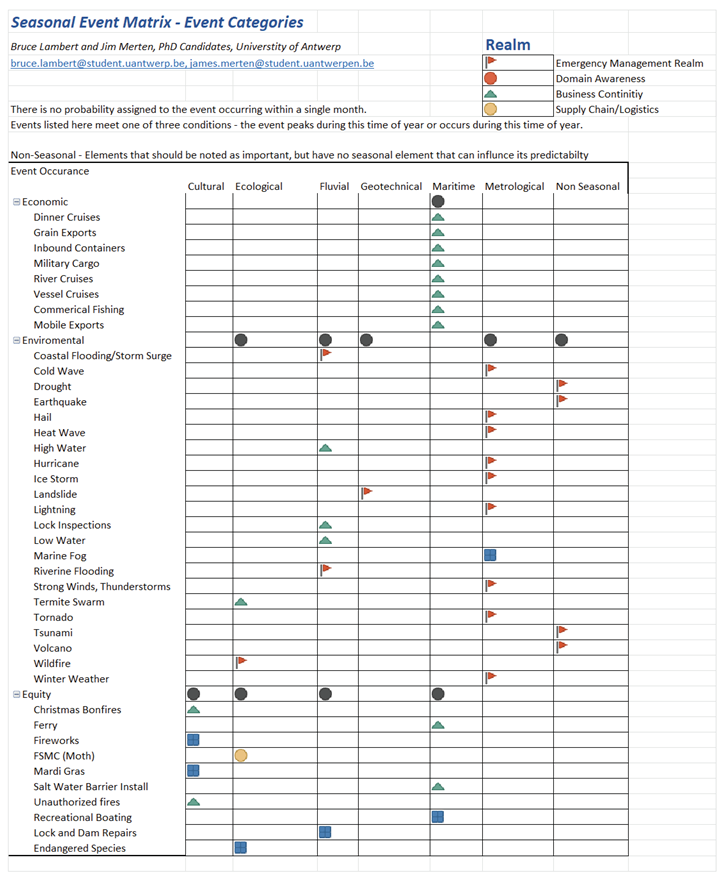 |
| 1 | This approach would be considered a “preassessment” activity as related to the guidance document released by the Cybersecurity and Infrastructure Security Agency. In the guidance, there is framework concerning how to identify a marine system and /or terminal and the some resources concerning information related to assessing risks. 3
|
| 2 | This paper talks about predictability, which this paper is defined as the season upon which an event may occur, or a general understanding of when an event will occur. It is not defined as a statical probability, which for this paper is a quantified estimation that an event will occur. In some ways, probability may be considered changeable, based on the appropriate timeframe, such as the probability that something will occur over the course of a year, or the probability that an event will occur within the next week, are much different. Oftentimes, this concept of annualized probability ignores the ability to the potential known timing of these events. |
| 3 | Other events, such as terrorist attacks, active shooters, but also component failure, such as pipeline rupture, reflect an uncertainty that may not necessarily have a seasonal element. |
| 4 | The events are also classified by the predominant Three E’s of Sustainability: Economics, Equity and Environmental. Those topics are discussed elsewhere.2 The list of all events, categorized by their initial Realm of responsibility is listed in the Appendix Table 3. As with any classification, there may be differences concerning why things more in certain areas, but the focus of this risk is tied to both the nature of the event and a perception concerning where the risk notification and communication will start the response process. |
| 5 | This elements will often be included in environmental assessment reports. |
| 6 | Based on the National Risk Index there are avalanche risks in the region, but there are landslide risks. However, the author was not able to determine a causal relationship between seasonality and landslide events in the region. |
| 7 | SEM summarizes the raw data into an Excel Pivot Table that users can manipulate.[7] The Columns reflect months when an event will likely happen if it did occur, while events that have no discernable month are listed as non-seasonal. A “notes column” allows users to retain information on particular activities not included in the pivot table. The structure was deemed the easiest to maintain/revise and did not require additional software. |
| 8 | There are several data sources on water conditions, such as the National Weather Service on flood conditions 33,34. For example, the Mobile District of the U.S. Army Corps of Engineers lists many resources related to monitoring water to support navigation.35 As such, riverine flooding was listed as non-seasonal as it can happen year round. |
| 9 | In some ways, these localized events could be considered as a result, but were listed here, due to the mix of desktop scan and feedback during the development process. |
| 10 | Table 1 was structured to serve as a repository for additional events that may be added to the SEM Model to maintain a log of the source of the event. |
| 11 | As one of the authors lives in the greater New Orleans Area, there is a bias towards more information on the lower Mississippi River then in other regions. |
| 12 | Discussions with Trade Associations, Pilots, Weather Service forecasters, Ports, and Federal Agencies were conducted throughout 2023 and early 2024. |
References
- United Nations, Department of Economic and Social Affairs. 17 Sustainable Development Goals. THE 17 GOALS | Sustainable Development. Published 2015. Accessed September 12, 2023. https://sdgs.un.org/goals.
- Lambert B, Merten J. The Development of a Seasonal Event Matrix, A Case Study for the Mobile County Maritime Sector. Transportation Research Procedia. Published online 2023.
- Cybersecurity and Infrastructure Security Agency, United States Army Corps of Engineers, Engineering Research and Development Center. Marine Transportation System Resilience Assessment Guide | CISA.; 2023:205. Accessed September 8, 2023. https://www.cisa.gov/resources-tools/resources/marine-transportation-system-resilience-assessment-guide.
- University of Idaho. Koppen Climate Classification for the Conterminous United States. Published online August 28, 2020. Accessed May 30, 2023. https://catalog.data.gov/dataset/koppen-climate-classification-for-the-conterminous-united-states.
- Hu PS, Schmitt RR, Robinson R, et al. 2023 Port Performance Freight Statistics Program: Annual Report to Congress.; 2023. [CrossRef]
- United States. Army. Corps of Engineers. Waterborne tonnage for principal U.S. ports and all 50 states and U.S. territories; Waterborne tonnages for domestic, foreign, imports, exports and intra-state waterborne traffic -. Published online July 25, 2021. Accessed January 2, 2024. https://usace.contentdm.oclc.org/digital/collection/p16021coll2/id/1492.
- US Army Corps of Engineers, Navigation Data Center, Waterborne Commerce Statistics Center. Master Docks Plus. Accessed January 3, 2024. https://publibrary.planusace.us/#/document/a4e13534-8c6f-43d6-d414-3c6017ce396b.
- Federal Emergency Management Administration. National Risk Index. Accessed August 4, 2022. https://hazards.fema.gov/nri/.
- Di Baldassarre G, Viglione A, Carr G, Kuil L, Salinas JL, Blöschl G. Socio-hydrology: conceptualising human-flood interactions. Hydrol Earth Syst Sci. 2013;17(8):3295-3303. [CrossRef]
- Ross A, Chang H. Socio-hydrology with hydrosocial theory: two sides of the same coin? Hydrological Sciences Journal. 2020;65(9):1443-1457. [CrossRef]
- United Nations Office for Disaster Risk Reduction. Biological Hazards and Risk Assessment.; 2018. Accessed January 6, 2024. http://www.undrr.org/publication/biological-hazards-and-risk-assessment.
- Gulland FMD, Baker JD, Howe M, et al. A review of climate change effects on marine mammals in United States waters: Past predictions, observed impacts, current research and conservation imperatives. Climate Change Ecology. 2022;3:100054. [CrossRef]
- Siddha S, Sahu P. Impact of climate change on the river ecosystem. In: Ecological Significance of River Ecosystems. Elsevier; 2022:79-104. [CrossRef]
- Robert A. RIVER PROCESSES: An Introduction to Fluvial Dynamics. Routledge; 2014. [CrossRef]
- Beacon YR Alaska. Deadly Wrangell landslide is part of a pattern in vulnerable Alaska mountainous terrain. Alaska Public Media. Published November 29, 2023. Accessed January 6, 2024. https://alaskapublic.org/2023/11/29/deadly-wrangell-landslide-is-part-of-a-pattern-in-vulnerable-alaska-mountainous-terrain/.
- Press · TA. Haines, Alaska, continues long recovery from late 2020 landslides | CBC News. CBC. Published July 25, 2022. Accessed January 6, 2024. https://www.cbc.ca/news/canada/north/haines-alaska-landslide-recovery-1.6531686.
- Landslide Hazards Program | U.S. Geological Survey. Accessed January 7, 2024. https://www.usgs.gov/programs/landslide-hazards.
- Moraca S. Using weather forecasts to predict landslides. Nature Italy. Published online June 2, 2023. [CrossRef]
- Abdelfattah M, Elsayeh ME, Abdelkader S. A proposed port security risk assessment approach, with application to a hypothetical port. Australian Journal of Maritime & Ocean Affairs. 2022;14(1):21-38. [CrossRef]
- Montewka J, Ehlers S, Goerlandt F, Hinz T, Tabri K, Kujala P. A framework for risk assessment for maritime transportation systems—A case study for open sea collisions involving RoPax vessels. Reliability Engineering & System Safety. 2014;124:142-157. [CrossRef]
- Seafarers Safety R and CA (Seacare A. Risks and hazards in the maritime industry - Seacare, Australia. Seafarers Safety, Rehabilitation and Compensation Authority (Seacare Authority). Published April 27, 2022. Accessed May 31, 2023. https://www.seacare.gov.au/safe-work/risks-and-hazards-in-the-maritime-industry.
- Abdulahi E, Fan L. Exploring and Validating Container Operational Risk Scale in Container Shipping: The Case of Ethiopian Shipping and Logistics Service Enterprise. Sustainability. 2021;13:9248. [CrossRef]
- Constantinos I. Chlomoudis, Petros L. Pallis, Ernestos S. Tzannatos. A Risk Assessment Methodology in Container Terminals: The Case Study of the Port Container Terminal of Thessalonica, Greece. JTTE. 2016;4(5). [CrossRef]
- Afenyo M, Khan F, Veitch B, Yang M. A probabilistic ecological risk model for Arctic marine oil spills. Journal of Environmental Chemical Engineering. 2017;5(2):1494-1503. [CrossRef]
- Chen J, Kang S, Chen C, et al. Changes in sea ice and future accessibility along the Arctic Northeast Passage. Global and Planetary Change. 2020;195:103319. [CrossRef]
- Neagoe M, Hvolby HH, Turner P. Why are we still queuing? Exploring landside congestion factors in Australian bulk cargo port terminals. Maritime Transport Research. 2021;2:100036. [CrossRef]
- Coast Guard urges preparedness for 2023 Atlantic hurricane season. United States Coast Guard News. Accessed February 15, 2024. https://www.news.uscg.mil/Press-Releases/Article/3414026/coast-guard-urges-preparedness-for-2023-atlantic-hurricane-season/https%3A%2F%2Fwww.news.uscg.mil%2FPress-Releases%2FArticle%2F3414026%2Fcoast-guard-urges-preparedness-for-2023-atlantic-hurricane-season%2F.
- MSIB Vol XXIII Issue 068 Waterway Status – Safety Zone for Fireworks Display Near Downtown Baton Rouge December 31st, 2023. U.S. Coast Guard. Accessed February 15, 2024. https://content.govdelivery.com/accounts/USDHSCG/bulletins/381f9f4.
- National Weather Service, National Oceanic and Atmospheric Administration. Temperature and Precipitation Graph for Mobile. Published 2023. Accessed January 2, 2024. https://www.weather.gov/mob/climate_kmob.
- U.S. Department of Commerce, National Oceanic and Atmospheric Administration, National Centers for Environmental Information. Storm Events Database. Accessed May 31, 2023. https://www.ncdc.noaa.gov/stormevents/.
- Santos RP dos. Some comments on the reliability of NOAA’s Storm Events Database. Published online June 23, 2016. [CrossRef]
- Southeast Drought Resources | USDA Climate Hubs. Accessed January 3, 2024. https://www.climatehubs.usda.gov/hubs/southeast/drought-map.
- NOAA - National Weather Service - Water. Accessed January 2, 2024. https://water.weather.gov/ahps/forecasts.php.
- USGS Current Water Data for the Nation. Accessed January 2, 2024. https://waterdata.usgs.gov/nwis/rt.
- Mobile District - Water Management Home Page. Accessed January 2, 2024. https://water.sam.usace.army.mil/.
- Hall T. Learning about types of fog in Louisiana and the dangers that they bring. https://www.kalb.com. Published April 11, 2019. Accessed September 20, 2023. https://www.kalb.com/content/news/Learning-about-types-of-fog-in-Louisiana-and-the-dangers-that-they-bring-508451881.html.
- Gard. Frequently asked questions - managing FSMC risks. Frequently asked questions - managing FSMC risks. Published May 16, 2023. Accessed January 7, 2024. https://gard.no/web/topics/article/20735032/asian-gypsy-moth.
- New Orleans Intercepts Asian Gypsy Moth Egg Masses on Vessel | U.S. Customs and Border Protection. Accessed December 1, 2023. https://www.cbp.gov/newsroom/local-media-release/new-orleans-intercepts-asian-gypsy-moth-egg-masses-vessel.
- Beasley L. Tiny but mighty: Termite swarming season is upon us. https://www.fox10tv.com. Published May 4, 2023. Accessed July 5, 2023. https://www.fox10tv.com/2023/05/04/tiny-mighty-termite-swarming-season-is-upon-us/.
- The Associated Press. At least 7 dead in massive vehicle crashes in Louisiana caused by “superfog.” National Public Radio. https://www.npr.org/2023/10/23/1208149273/massive-car-crash-louisiana-superfog. Published October 23, 2023. Accessed October 29, 2023.
- Mostafiz RB, Friedland CJ, Rohli RV, Bushra N. Estimating Future Residential Property Risk Associated with Wildfires in Louisiana, U.S.A. Climate. 2022;10(4):49. [CrossRef]
- Southern area a top priority for national wildfire response. US Forest Service. Published September 13, 2023. Accessed November 28, 2023. https://www.fs.usda.gov/features/southern-area-top-priority-national-wildfire-response.
- Festival of the Bonfires – Cajun Style. Accessed November 25, 2023. http://festivalofthebonfires.org/.
- Safety Zone; French Quarter Festival Fireworks Display, New Orleans LA. Federal Register. Published March 29, 2023. Accessed January 3, 2024. https://www.federalregister.gov/documents/2023/03/29/2023-06460/safety-zone-french-quarter-festival-fireworks-display-new-orleans-la.
- Emily A. O’Dell. New Orleans and Mobile: Mardi Gras Connections in the Gulf South. Published 2019. Accessed November 25, 2023. https://louisianafolklife.org/LT/Articles_Essays/lfmMardiGrasConnections.html.
- WDSU Digital Team. Heads up: New Orleans road closures announced for Mardi Gras Day. WDSU. Published February 28, 2022. Accessed November 25, 2023. https://www.wdsu.com/article/new-orleans-road-closures-mardi-gras-day/39235341.
- New Orleans District > Missions > Engineering > Stage and Hydrologic Data > SaltwaterWedge > SaltwaterWedgeOverview. Accessed January 3, 2024. https://www.mvn.usace.army.mil/Missions/Engineering/Stage-and-Hydrologic-Data/SaltwaterWedge/SaltwaterWedgeOverview/.
- Allison MA, Vosburg BM, Ramirez MT, Meselhe EA. Mississippi River channel response to the Bonnet Carré Spillway opening in the 2011 flood and its implications for the design and operation of river diversions. Journal of Hydrology. 2013;477:104-118. [CrossRef]
- Hiatt M, Snedden G, Day JW, et al. Drivers and impacts of water level fluctuations in the Mississippi River delta: Implications for delta restoration. Estuarine, Coastal and Shelf Science. 2019;224:117-137. [CrossRef]
- Nonstop dredging kept the Mississippi River open this year, but moving mountains of sand creates its own problems | WWNO. Accessed January 2, 2024. https://www.wwno.org/coastal-desk/2023-12-19/nonstop-dredging-kept-the-mississippi-river-open-this-year-but-moving-mountains-of-sand-creates-its-own-problems.
- US Army Corps of Engineers. Navigation Public Notices. Navigation Public Notices. Accessed January 3, 2024. https://www.mvn.usace.army.mil/Missions/Navigation-Public-Notices/.
- U.S. Census Bureau. USA Trade Online. Accessed May 31, 2023. https://usatrade.census.gov/.
- Breeze MA 1801 GBPG, Us F 32563 C. Ship Island - Gulf Islands National Seashore (U.S. National Park Service). Accessed January 3, 2024. https://www.nps.gov/guis/planyourvisit/ship-island.htm.
- La DOTD - Ferry / Moveable Bridge Status. Accessed January 3, 2024. http://wwwapps.dotd.la.gov/operations/ferrystatus/fmbs_status.aspx?PID=F_STATUS.
- Mobile Bay Ferry. Accessed January 3, 2024. https://mobilebayferry.com/.
- City of Mobile. Mobile, Alabama Cruises. Accessed May 31, 2023. https://www.mobile.org/cruise/.
- Cruise. Port NOLA. Accessed January 3, 2024. https://portnola.com/cruise.
- Creole Queen | New Orleans Paddlewheeler Mississippi River Cruises. Accessed January 3, 2024. https://www.creolequeen.com/.
- New Orleans Steamboat Company | Steamboat Natchez. Accessed January 3, 2024. https://www.steamboatnatchez.com/.
- Cruises on the Mississippi River. Accessed January 3, 2024. https://rivercruiseadvisor.com/articles-america-river-cruises/cruises-on-the-mississippi-river/.
- National Port Readiness Network (NPRN) | MARAD. Accessed January 3, 2024. https://www.maritime.dot.gov/ports/strong-ports/national-port-readiness-network-nprn.
- Foster K, Sealls, Alan. Gulf Coast Fog Season. WPMI. Published December 8, 2020. Accessed January 3, 2024. https://mynbc15.com/weather/weather-facts/fog-season-is-here.
- National Weather Service, National Oceanic and Atmospheric Administration, US Department of Commerce. Fog Over Water. Accessed September 20, 2023. https://www.weather.gov/safety/fog-water.
- National Weather Service, National Oceanic and Atmospheric Administration, U.S. Department of Commerce. Gulf Coast Marine Forecasts by Zone. Gulf Coast Marine Forecasts by Zone. Accessed January 3, 2024. https://www.weather.gov/marine/gulfmz.
- Annual Estimates of the Resident Population for Counties in Mississippi: April 1, 2020 to July 1, 2022 (CO-EST2022-POP-28). Published online March 2023.
- Li M, Wang J, Sun X. Scenario-based risk framework selection and assessment model development for natural disasters: a case study of typhoon storm surges. Natural Hazards. 2016;80. [CrossRef]
- Algarin Ballesteros JA, Hitchens NM. Meteorological Factors Affecting Airport Operations during the Winter Season in the Midwest. Weather, Climate, and Society. 2018;10(2):307-322. [CrossRef]
- Gloria Kulesa. Weather And Aviation: How Does Weather Affect The Safety And Operations Of Airports And Aviation, And How Does Faa Work To Manage Weather-Related Effects? In: ; 2003. Accessed December 30, 2023. https://www.semanticscholar.org/paper/WEATHER-AND-AVIATION%3A-HOW-DOES-WEATHER-AFFECT-THE/4f275c50672865ed16b4e4b3619e0aae698fd450.
- Ismail Gultepe. A Review on Weather Impact on Aviation Operations: Visibility, Wind, Precipitation, Icing | Journal of Airline Operations and Aviation Management. Journal of Airline Operations and Aviation Management. 2023;2(1):1-44. [CrossRef]
- Lopez A. Vulnerability of Airports on Climate Change: An Assessment Methodology. Transportation Research Procedia. 2016;14:24-31. [CrossRef]
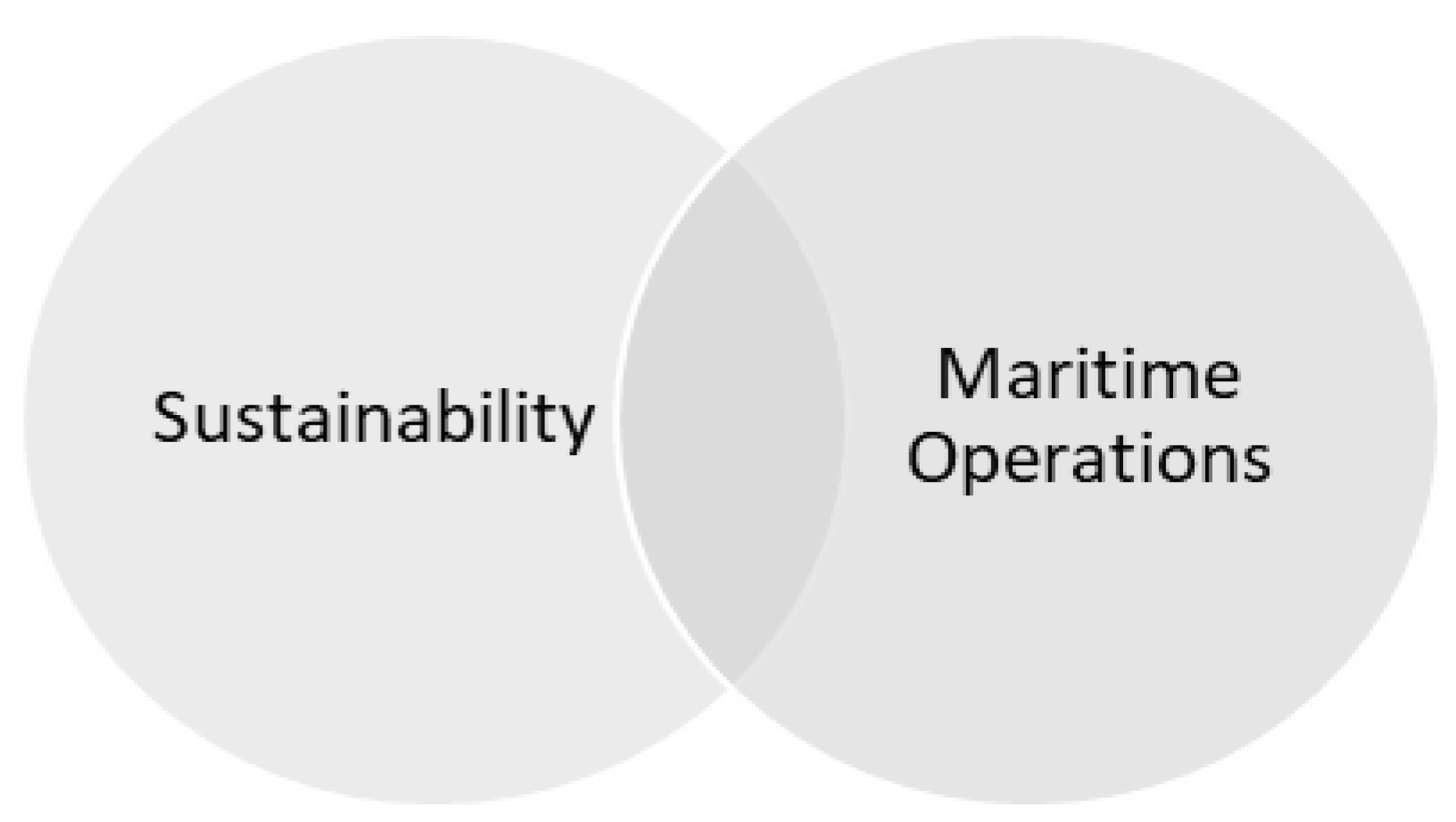
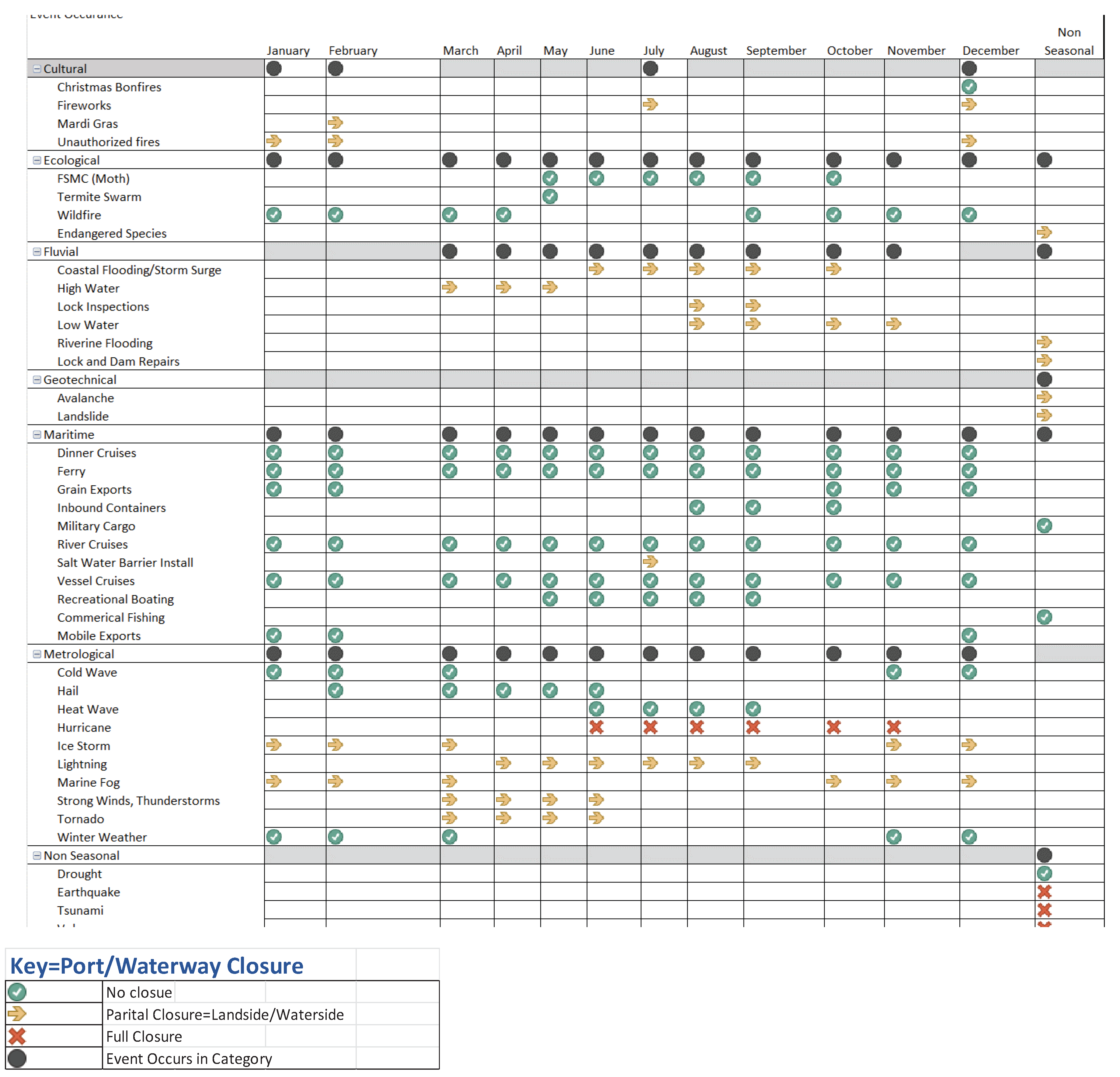
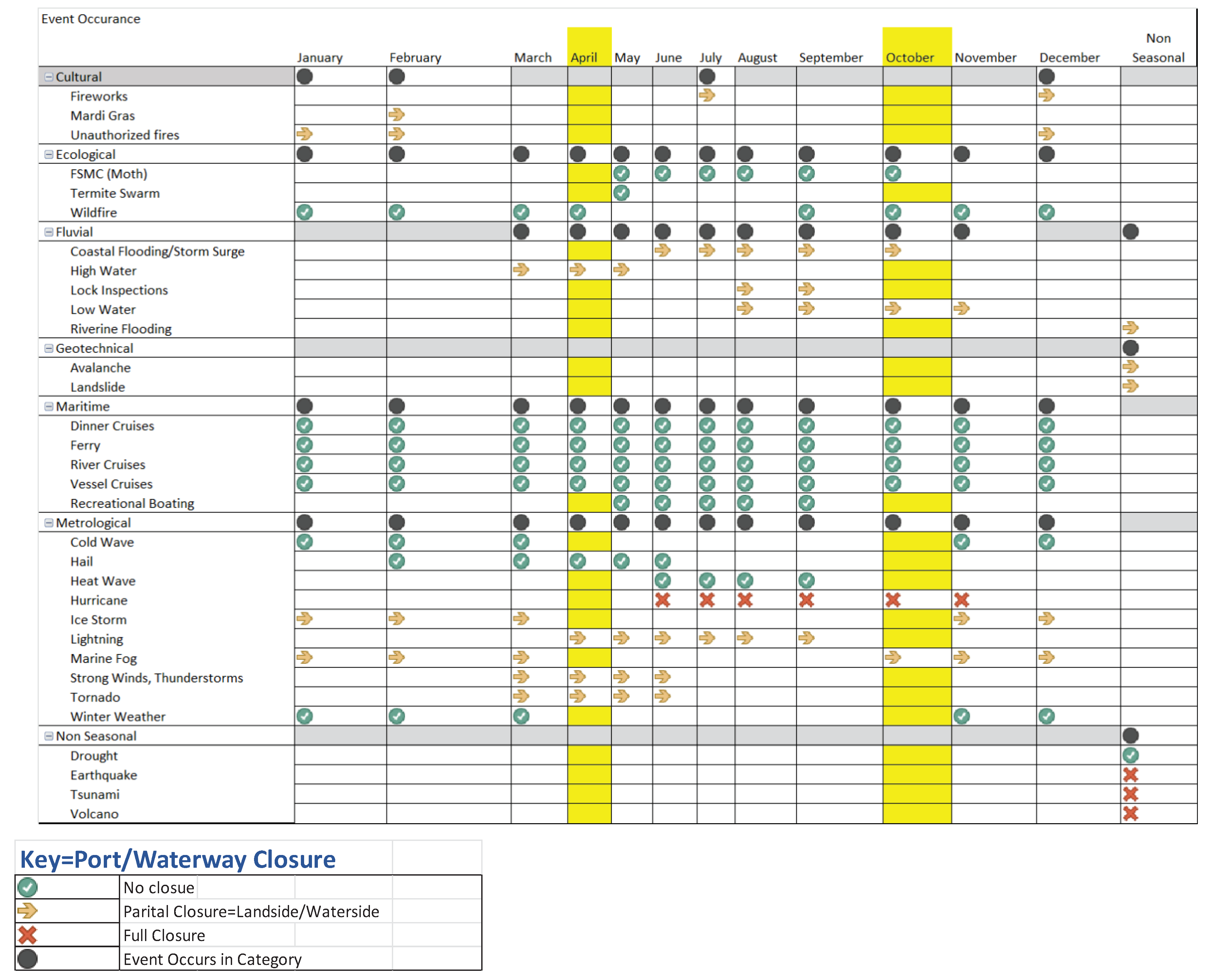
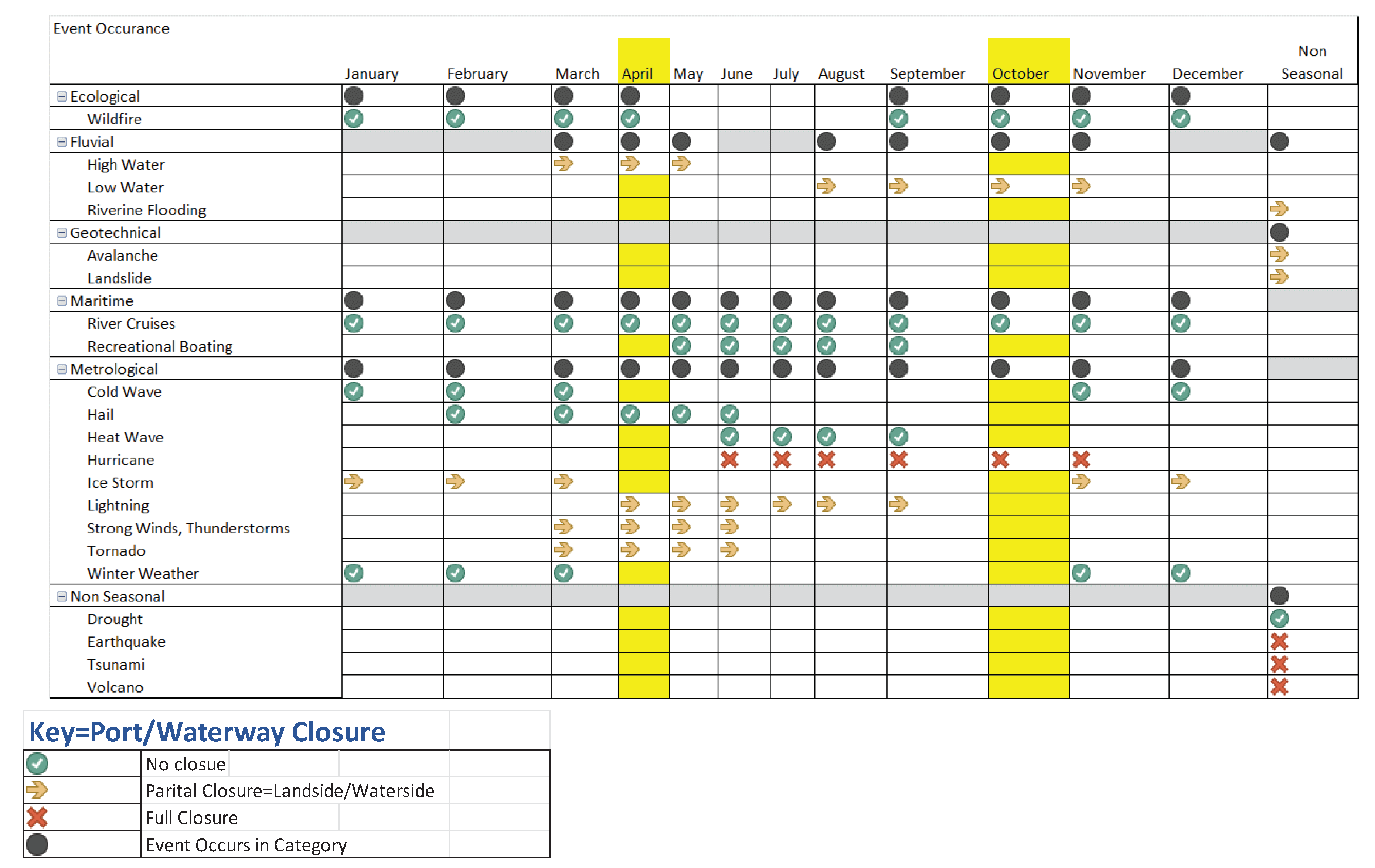
| Category | Event | Notes | Seasonality | Source |
| Ecological | Flighted Spongy Month Complex | Vessels arriving from the Far East must be inspected for egg masses to prevent | May to October | 37,38,38 |
| Ecological | Termite Swarms | Terminates can cause considerable damage, but often that damage is observed after the “swam” occurs. The swarms are very annoying to workers doing work outside at night. Generally, the swarms occur along and south of the I-10 corridor. | May | 39 |
| Ecological | Wildfire | Wildfires occur throughout the region, but swamp fires can lead to heavy smoke. A swamp fire combined with heavy fog led to a significant traffic incident in the greater New Orleans area.40 | Typically from fall into Spring, although they may occur year-round | 41,42 |
| Cultural | Christmas Bonfires | Bonfires are lit along the river to “guide Poppa Noel” to visit Children on Christmas Eve. There is localized congestion. | Christmas | (Festival of the Bonfires – Cajun Style) |
| Cultural | Fireworks | Limited Fireworks in downtown New Orleans. The Coast Guard provides notifications through the Federal Register. | The Mississippi River by Jackson Square is closed for fireworks on the 4th of July and New Year's Eve. | (44 |
| Cultural | Mardi Gras | Carnival Season begins on January 6 and extends to Mardi Gras (Fat Tuesday). While the navigation and transportation systems continue to operate, traffic will be heavy by parade routes, and hotel space will be limited also. | January -March | Local Knowledge45,46 |
| Cultural | Unauthorized Fires | Fires are set in unauthorized areas, leading to fires at various piers along the river. | December -March | Interview with New Orleans Fireboat Captain |
| Maritime Operations | Saltwater Silt Construction | Occasionally, low water periods allow saltwater to come up the Mississippi River, which can damage drinking water access. The Corps of Engineers is responsible for mitigating this, typically by building a saltwater dam in the river. | June | 47 |
| Fluvial | Low Water | The Mississippi River drains the Central U.S., and water levels are predicated on snow melt and precipitation events. Traditionally, the fall is the low water period. Other waterways may be influenced by coastal or rain events. | Fall | 48–50 |
| Fluvial | High Water | Traditionally, Spring is the high-water period in the Mississippi River. Other waterways may be influenced by coastal or rain events. | Spring | Local Knowledge |
| Fluvial | Lock Inspections | The Corps is responsible for locks and dams on federal waterways. Usually, locks are inspected during low water conditions. | Low water periods – the elements listed here are placeholders, as the United States Corps of Engineers (USACE ) notifies partiers concerning any expected/unplanned facility closures/closures | 51 |
| Maritime | Inbound Containers | Containerized inbound shipments arrive in anticipation of the Holiday shopping season. | The holiday rush typically occurs in August and ends in the first week of December. | US Trade Information 52 |
| Maritime | Ferry | There are several ferry services in the State of Louisiana, operated mainly by the LA Department of Transportation. However, there are execution ferries to Ship Island in Mississippi and a ferry in Alabama. | Year-round, except for the Ship Island Ferry, which runs from March to October | 53–55 |
| Maritime | Grain Shipments | Mississippi River is one of the Nation’s grain export corridors. Shipments by barge and train arrive at the end of the harvest and are shipped out of the port. | September – February | US Trade Information 52 |
| Maritime | Vessel Cruise | Ocean-going Vessel Cruise | Year-round in New Orleans, but seasonal in Mobile | Resources from the City of Mobile and the Port of New Orleans56,57 |
| Maritime | Dinner Cruises | Local dinner and excursion vessels | The New Orleans Steamboat Company and the Creole Queen run two services | 58,59 |
| Maritime | River Cruises | Inland Shallow draft vessels | Year Round south of St. Louis | 60 |
| Maritime | Military Cargo | Ports dedicated to supporting Military operations through the National Ports Readiness Network | Year-round | 61 |
| Metrological | Marine Fog | Marine Fog is caused by warm air moving over colder water, resulting in advection fog. | Typically, it starts in late fall and ends in early Spring | 62–64 |
Disclaimer/Publisher’s Note: The statements, opinions and data contained in all publications are solely those of the individual author(s) and contributor(s) and not of MDPI and/or the editor(s). MDPI and/or the editor(s) disclaim responsibility for any injury to people or property resulting from any ideas, methods, instructions or products referred to in the content. |
© 2024 by the authors. Licensee MDPI, Basel, Switzerland. This article is an open access article distributed under the terms and conditions of the Creative Commons Attribution (CC BY) license (http://creativecommons.org/licenses/by/4.0/).





